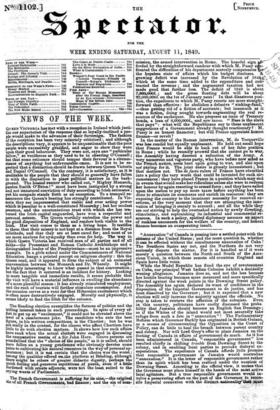NEWS OF THE WEEK.
QUEEN VICTORIA has met with a reception in Ireland which justi- fies our expectation of the response that so loyally-inclined a peo- ple would make to the advances of their Sovereign. The fashion of the reception has been very minutely criticized ; and although the descriptions vary, it appears to be unquestionable that the poor people were excessively gratified, and eager to show they were upon their good behaviour. They were not, says one "particular fellow," so vociferous as they used to be in cheering O'Connell ; but that some reticence should temper their fervour is a circum- stance of anything but unfavourable omen. It is not to be re- gretted that a distinction should be drawn between Queen Victoria and Daniel O'Connell. On the contrary, it is satisfactory, as it is creditable to the people that they should so generally have fallen in with the disposition to place political matters in the back- ground. The heated runner who called out," Mighty Monarch, pardon Smith O'Brien!" must have been instigated by a strong and not unnatural conviction of duty according to Irish estimates ; yet his escapade stands forth as an exception. To a tranquil re- assurance the Queen's bearing has strongly contributed. In Vic- toria they see impersonated that stable and ever acting power which is peculiar to a well-constituted Monarchy ; but her modest presence, and the unostentatious trust with which she has tra- versed the Irish capital unguarded, have won a respectful and personal esteem. The Queen worthily embodies the power and the good disposition of England, and renders both visible to the Irish. Her visit comes to them as a living hope. It testifies to them that their misery is not kept at a distance from the Royal solicitude, and that they are at least cared for ; and most of us are more anxious for sympathy than even for help. The way in which Queen Victoria has received men of all parties and of all faiths—the Protestant and Roman Catholic Archbishops and a distinguished leader of the Presbyterians—must be an impressive example. In a girls school under the Commissioners of National Education hangs a printed precept on religious charity : this the Queen read, and it appeared to form the subject of an animated conversation between the Monarch and Dr. Whately. It might be highly interesting to know what passed in that conversation ; but the fact that it occurred is an incident for history. Looking to more tangible and immediate results, it seems probable that the visit will have a material influence in swelling the abundance of a more plentiful season : it has already stimulated employment, and the rush of tourists will further stimulate consumption. And the occasion serves as a vent for that Hibernian excitement which is often more destructively engaged. Morally and physically, it seems likely to feed the Irish for the autumn.


























